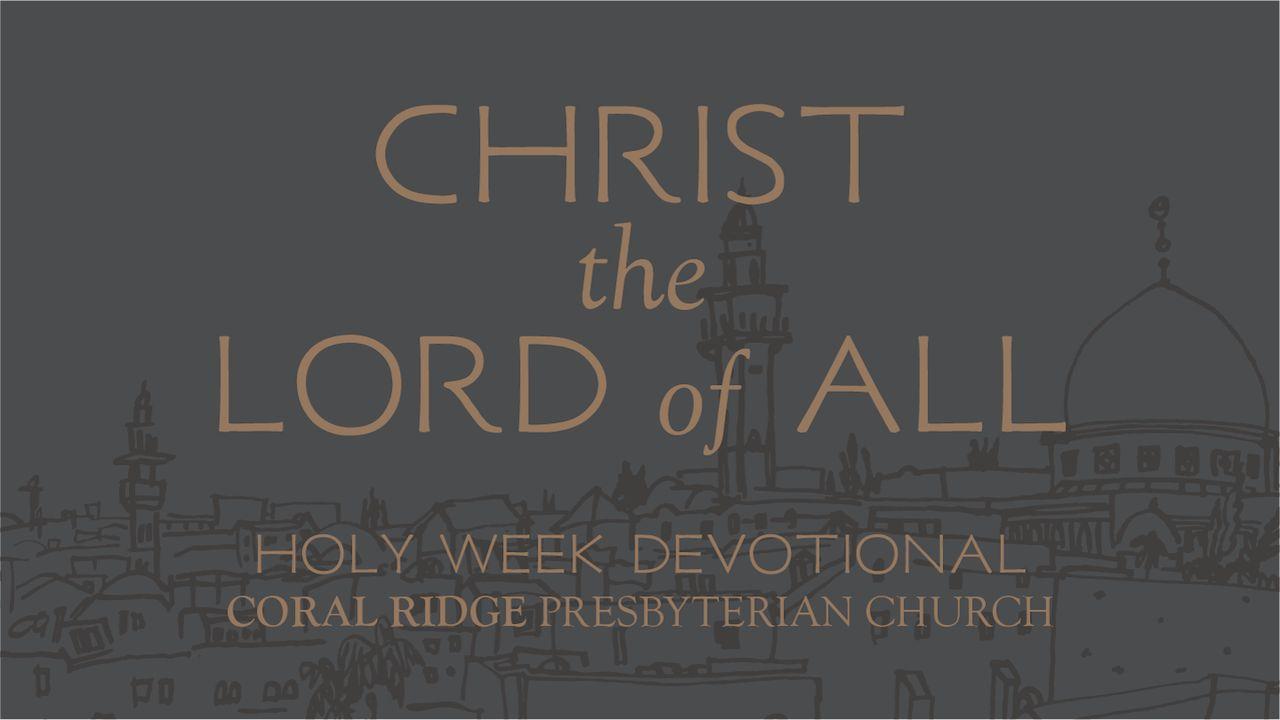Christ the Lord of All | Holy Week Devotionalตัวอย่าง

Too often when we read the Scriptures, we approach it like so many other stories. These things happened once upon a time or in a galaxy far, far away. Despite the constant stream of archaeological finds that corroborate the historical claims of the Bible, many modern scholars insist the Bible contains little more than moralistic myths; there may be kernels of history, but they remain hidden beneath a husk of fantasy and superstition. Even we, who affirm that the Bible tells the truth which God has revealed, often allow a subtle unbelief to creep in—perhaps God parted the Red Sea or raised Jesus from the dead, but that was a different world, a different time, in a faraway land.
Not so!
Christ was born in the early first century, under Roman occupation in the land God promised to Abraham’s children, to a people shrouded in darkness. God had warned of a famine “not of bread, nor a thirst for water, but of hearing the words of Yahweh” (Amos 8:11), and the last prophet had died four-hundred years earlier. King Herod was a corrupt puppet. When there were signs in the sky that pointed to the birth of the King, Herod did not acknowledge God’s Messiah, but instead exterminated scores of children to snuff his Messiah out.
Rome was the beastly empire seen by Daniel, “terrifying and dreadful and exceedingly strong” (Dan. 7:7). But each day in Herod’s Temple, the priests of Yahweh dutifully offered sacrifices to God for the blessing and good health of the Roman emperor.
The promised land had become like Egypt. Corrupt tyrants ruled, faithless priests ministered, demons haunted the land, and the poor in spirit were crushed. But God always remembers his promises and hears the cries of his people.
Salvation either happens here, in our world—in history—or else there is no salvation at all. As we meditate on the life of Christ, his death, and resurrection this week, we must do so knowing that we aren’t talking about once upon a time, but the great acts of the Creator in history. God promised our fathers Abraham, Isaac, Jacob, and David that he would act in their lives and in the lives of their children, unto a thousand generations; to redeem them in the real world. And God promised that one day a Son would be born who would inherit the earth itself. He would be given a kingdom and the throne of his father David and all authority to draw all nations to himself (Dan. 7:13-14; Psa. 2; Isa. 9:6-7).
The most important question we all must answer is the question Jesus asked Peter at Caesarea Philippi, “Who do you say that I am?” At the height of the Roman occupation, ruled by puppets, Roman sycophants, and living among a wicked and adulterous generation, Peter proclaimed, “You are the Christ, the Son of the living God.” Not a good teacher, a moral leader, or a rabbi. You are the Christ—God’s anointed servant—and the Son of the living God. And God’s Son declared war that day: “On this rock I will build my church, and the gates of hell shall not prevail against it” (Matt. 16:18).
Christ did not come to abandon the world to the hands of false lords pretending to be divine. Christ did not come to leave the world in the hands of demons and wolves, but so that every knee would bow, acknowledging that he alone is Lord (Phil. 2). Conquering Rome might have only required a large enough army, but defeating the powers of hell required death to storm Hades’ gates. In the clutches of sin, we remained under the power of death. Christ came to “taste death for everyone” in order to “destroy the one who has the power of death… the devil” (Heb. 2:9, 14). And Christ promised his disciples that some “standing here will not taste death until they see the Son of Man coming in his kingdom” (Matt. 16:28).
The incarnation of Christ was nothing less than the arrival of the champion of the armies of the Lord in the flesh. In Christ, God—the “man of war”—came to destroy hell’s Goliath (Ex. 15:3). Christ came to throw down the Accuser, shattering hell’s defenses (John 12:31). The King came to dwell—to die—and even to rise, among us and for us. The Word that is God and was with God, through whom the real world was created, stepped into history to make his people new.
This is the true story of history and the focal point of God’s revelation; when he they call myth took on flesh, living in order to die. The biblical story is about real life—this life—your life. Jesus is the Lord of lords—he is Emperor—and God has appointed a day when all men will be judged by him. Every ruler ascends to power or falls into obscurity by Christ’s own command. He has made us priests, citizens of his Kingdom, a royal nation. Against every power and every tyrant, “he will not grow faint or be discouraged till he has established justice in the earth; and the coastlands wait for his law” (Isa. 42:4). The gates of hell will not prevail against him.
ข้อพระคัมภีร์
เกี่ยวกับแผนฯ

We pray the One who walked the dusty roads of Judea during his humiliation, the One who is now exalted at the right hand of the Father—Christ the Lord of All—will meet you as we together celebrate Holy Week. Coral Ridge Presbyterian Church 2023 Holy Week Devotional.
More









